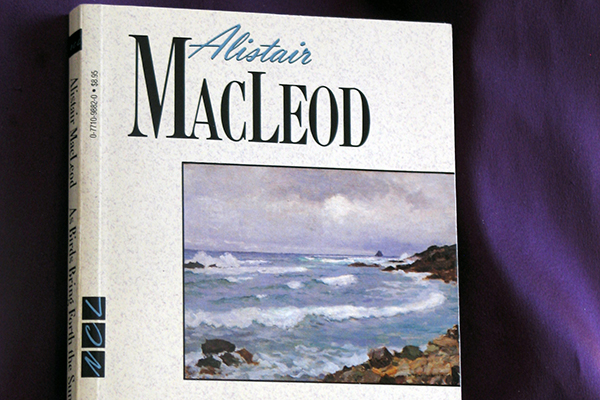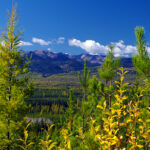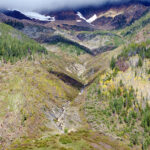Home »

Power of the short story in full display
Book Review
By Derryll White
MacLeod, Alistair. As Birds Bring Forth the Sun and Other Stories.
“It is hard to not known what you do know.”
 This is MacLeod’s second collection of short stories. His memory is that of an East Coaster – tribal, connected to his past.
This is MacLeod’s second collection of short stories. His memory is that of an East Coaster – tribal, connected to his past.
Although born in Saskatchewan, Alistair MacLeod returned to his family’s Cape Breton roots at the age of 10, and it shows in these stories. There is a difference. My girlfriend is a New Brunswicker and some of my friends hail from Newfoundland. It shows – they regale themselves and others with stories of the ‘home land,’ something westerners pull back from perhaps thinking things are still too new here. My observation is that they are more oral, as is Alistair MacLeod. He really is a storyteller of old.
The opening story, ‘The Closing Down of Summer,’ grounds the reader in the local, declares that these will be intimate stories about neighbours and kinfolk. It also states that this is the way the world works, with an interwoven past and a shared present that takes everyone forward in unison. And we know we go forward to inevitable death, again becoming part of the story of the living.
So much custom, such history gathered and kept by families living close together over hundreds of years. And so foreign to me. MacLeod writes of things I no longer know, but fervently wish I did.
In the ‘Winter Dog,’ as in many of MacLeod’s stories, the reader is led to loss, to that foreboding feeling that all will change, all will vanish. The writer moves the reader forward, however, by offering the certitude that in loss there is change – and growth. That is MacLeod’s gift, I think, that out of the telling of the stories comes remembrance, and the way forward.
Many of these stories have a sense of foreboding, of death to come. MacLeod, however, uses that tribal sense of family to project past the fact of death to look behind himself, and in doing so to honour, and move forward. But, as in ‘Second Spring,’ there is also attention to the living, to growth. It occurs to me that Alistair MacLeod knows men well and is gifted in presenting them cloaked in the world of their own doing – the small and natural becomes magical under his skill.
This sense carries through in ‘The Tuning of Perfection’ where MacLeod salutes the old ways, the days when men were as honest and as good as their word and when they worked with the mountain instead of against it. And he salutes the culture memory that allows men to reach back, past what they know, to clan roots that formed them almost without their knowledge.
This is a beautiful book for any reader who appreciates the power of the short story form.
****
Excerpts from the volume:
DEVELOPMENT MINERS – Many of us carry one shoulder permanently lower than the other where we have been hit by rockfalls or the lop of the giant clam that swings down upon us in the narrow closeness of the shaft’s bottom. And we have arms that we cannot raise above our heads and touches of arthritis in our bodies and in our shoulders, magnified by the water that chills and falls upon us in our work. Few of us have all our fingers and some have lost either eyes or ears from falling tools or discharged blasting caps or flying stone or splintering timbers.
GOOD ADVICE – When I was a boy my father told me that I would never understand the nature of sex until I had participated in it in some worthwhile way, and that there was little point in trying to grasp its meaning through erotic reading or looking at graphic pictures or listening to the real or imagined experiences of older men. As if the written or spoken word or the mildly pornographic picture were capable of reaching only a small portion of the distance it might hope to journey on the road to understanding.
LIFE – He drinks because he cares. It’s just the way he is.
Not everyone drinks.
Not everybody cares, and if he gives you his word, he’ll never drink until he gets there. We all know that.
LOST SANTA – But then I look at those before me. I look at my parents drawn together before the Christmas tree. My mother has her hand upon my father’s shoulder and he is holding his ever-present handkerchief. I look at my sisters who have crossed this threshold ahead of me and now each day journey farther from the lives they knew as girls. I look at my magic older brother who has come to us this Christmas from half a continent away, bringing everything he has and is. All of them are captured in the tableau of their care.
“Every man moves on,” says my father quietly, and I think he speaks of Santa Claus, “but there is no need to grieve. He leaves good things behind.”
THE VIEW – And it was truly spectacular. One could see for miles along the floor of the valley and over the tops of the smaller mountains and when one looked to the west there was the sea. There it was possible to see the various fishing boats of summer and the sealing ships of winter and the lines of Prince Edward Island and the flat shapes of the Magdalen Islands and more to the east, the purple mass of Newfoundland.
ENVIRONEMTALISM – “Your timber here on your own land is as good as ever, they say.”
“Yes,” he said. “It’s pretty good.”
“That Archibald,” they say, “no one knows where he gets all them logs, hauls them out with them horses, and doesn’t seem to disturb anything. Year after year, threats the mountain as if it were a garden.”
 – Derryll White once wrote books but now chooses to read and write about them. When not reading he writes history for the web at www.basininstitute.org.
– Derryll White once wrote books but now chooses to read and write about them. When not reading he writes history for the web at www.basininstitute.org.







